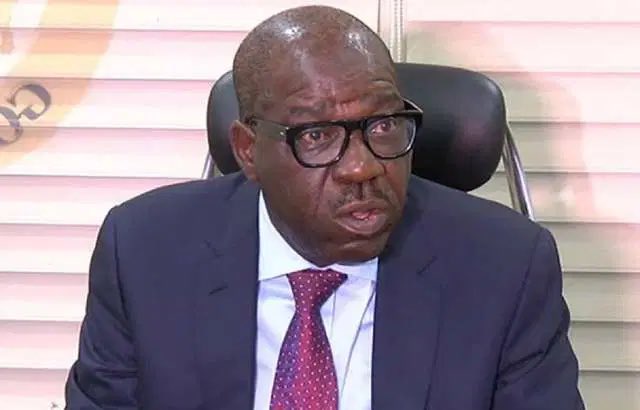Governor Godwin Obaseki of Edo State has expressed that he does not wish to be remembered solely for the numerous political battles he fought during his time in office.
Speaking to reporters after inaugurating the Airport Road Parks and Garden project, Obaseki emphasized his desire to leave behind a legacy defined by development and growth, not conflicts.
“I certainly don’t want to be remembered for the fights,” Obaseki stated, reflecting on his tenure.
The inauguration of the Airport Road Parks and Garden project, a symbol of Obaseki’s commitment to urban beautification and green spaces, was part of his administration’s focus on revitalizing public spaces in the state.
During the event, the governor explained the sustainability plan for the new garden.
He revealed that a revenue model has been designed to keep the project self-sustaining, with funds from surrounding billboards and support from the nearby Prestige Hotel contributing to maintenance.
“We created a revenue model to support the management of these public spaces,” Obaseki said.
“The revenue from billboards around here will be directed towards managing the garden, and the Prestige Hotel will help sustain it. For community support, the military has also promised to assist with security.”
As his tenure nears its end, Obaseki finds himself facing fresh challenges. The arrest of four Edo State officials by the Economic and Financial Crimes Commission (EFCC) has sparked accusations from the state government.
They claim it is an attempt to disrupt governance in the state as Obaseki prepares to hand over power in just over a week.
This recent incident adds to a long list of battles Obaseki has faced throughout his governorship, beginning with a protracted struggle within his initial political home, the All Progressives Congress (APC).
Obaseki first ran for governor on the APC platform in 2016, but intense clashes with party leaders eventually led him to leave the APC and join the Peoples Democratic Party (PDP), where he successfully ran for a second term in 2020.
Another high-profile conflict involved his deputy, Philip Shaibu, who was impeached and later reinstated by court order, highlighting internal tensions within Obaseki’s administration.
Obaseki also endured challenges with 14 elected lawmakers who were unable to take office due to internal disputes and thus completed their terms without ever being sworn in.
Despite these numerous conflicts, Obaseki prefers to highlight his achievements, particularly in the area of infrastructure and community development, rather than the political drama that has often surrounded his administration.
He noted that the Airport Road Parks and Garden project exemplifies his broader vision of development for Edo State, which goes beyond the controversies.
“When we thought about all these public spaces and how to manage them, we knew it was important to put systems in place that would support their maintenance,” Obaseki said.
His administration’s urban development projects reflect his belief in doing the work before celebrating, he added, acknowledging that only a fraction of completed projects have been officially commissioned.
“I believe first in doing the work before celebrating,” Obaseki remarked.
“We will try to commission as many projects as possible, but I don’t think we will be able to officially open even 10 percent of what we have done.”
Obaseki said he felt encouraged by the support from the people of Edo State, who voted for him in two separate elections.
He attributed this backing to his efforts to create meaningful change, adding that he is grateful for the opportunity to serve.
“I feel appreciated,” Obaseki said. “The response from our people has been commendable, and no wonder they came out and voted for us. I cannot stop saying thank you for the opportunity to serve.”

